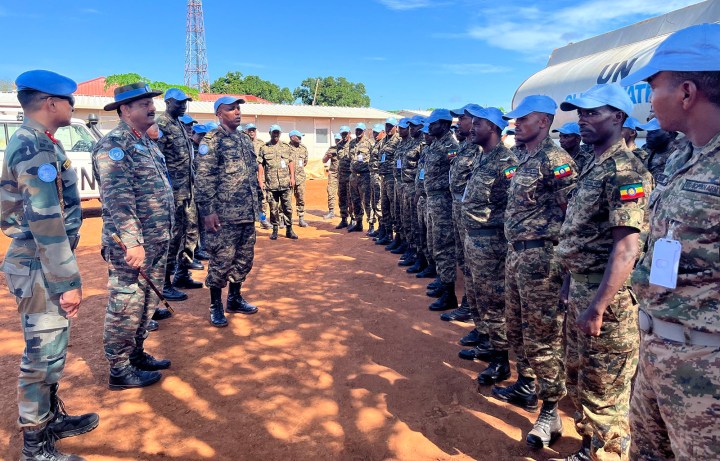ISS TODAY OP-ED
UNMISS critical to free and fair South Sudan elections overshadowed by threats of violence

The UN mission should be renewed and reinforced to help avert electoral violence and a relapse into conflict.
This week, the United Nations Security Council (UNSC) meets to renew the mandate of the UN Mission in South Sudan (UNMISS) for another year. It has been renewed over 13 times since the mission’s inception in 2011, but this time will be vital.
The country is at a crossroads. Elections are planned for December 2024 in a context of inter-communal violence, political infighting and mobilisation of armed groups. Most South Sudanese want elections in December to choose their leaders and avert the bloated government expenses arising from the large, unwieldy coalition government. But uncertainties are growing about the likelihood of the planned polls.
The risk of electoral violence is high due to the slow implementation of the 2018 peace agreement. Various reports suggest that tasks needed for voting to take place remain unfinished or haven’t yet started. But South Sudan’s government officials say nothing can stop the polls.
Read more in Daily Maverick: South Sudan facing threat of yet another missed election deadline and national disruption
Some political parties have started campaigning in various states, contrary to the electoral law prohibiting campaigns before the National Elections Commission’s formal announcement to do so, say observers. Key opposition groups, such as the Sudan People’s Liberation Movement-In Opposition (SPLM-IO), are threatening to boycott the elections because preconditions for credible, free and fair polls are not in place. UN Undersecretary-General for Peace Operations Jean-Pierre Lacroix has warned of election violence.
Given these difficulties, UNMISS’s mandate should be renewed and the mission reinforced. The UNSC should also revisit the mission’s current objectives, capacity and resources so that it can support the country’s transition, particularly elections.
South Sudan’s transition has already been extended several times. The peace agreement initially planned for the transitional government to end with polls in December 2021. Delays in implementing the deal pushed the election to 2024, and now uncertainties prevail again.
Constitution in limbo
After five years of transition, the implementation of most peace agreement provisions remains behind. The major factors driving uncertainty around the 2024 elections arise from delays in constitution-making, setting up electoral bodies and security preparations for the polls. Other problems relate to the census and refugee resettlement.
According to the peace agreement, a permanent constitution should have been completed two years into the transition, and must be in place to guide the elections. Yet the process has lagged, affecting the overall transition and the electoral environment in particular.
The rebuilding of institutions needed to draft the constitution and oversee the electoral process has also been slow. The National Constitutional Review Commission, National Elections Commission, and Political Parties Council were only reconstituted in November 2023. But the 2023-24 national budget didn’t provide enough funds for these to operate effectively.
Election security concerns
The most ominous delay is in preparing for election security. The transitional government was responsible for restructuring security institutions and training and deploying 83,000 Necessary Unified Forces. These comprise police, prisons, wildlife, intelligence and military officers from the forces loyal to the Sudan People’s Liberation Movement-In Government (SPLM-IG) and SPLM-IO in the pre-transition period. But this task remains unfinished. A critical precondition for polls is redeploying the Necessary Unified Forces to provide election-related security.
The UN Secretary-General’s Special Representative and UNMISS head, Nicholas Haysom, recently underscored the country’s inability to finalise these security arrangements. He said this posed a threat to peace before, during and after the planned elections.
Opposition political parties also worry about the limited civic and political space in South Sudan. UNMISS has received reports of censorship, intimidation and arbitrary arrests against opposition party members, journalists and activists.
The complex task of managing South Sudan’s transition, including averting electoral crises, hinges on a concerted effort by various stakeholders, including UNMISS. For over 13 years, UNMISS has protected civilians and helped implement peace agreements.
Since 2021, its mandate has been to “prevent a return to civil war, build durable peace at the local and national levels, and support inclusive and accountable governance and free, fair and peaceful elections.’ However, recent research by the Institute for Security Studies indicates that the mission lacks an explicit security sector reform mandate and the capacity to carry it out.
Current discussions to renew UNMISS’s mandate offer an opportunity for adaptation. The role of the mission and other UN entities in supporting security sector reform and creating institutions responsive to democratic oversight should be strengthened. The UNSC should consider giving UNMISS an explicit mandate to support such reforms, including forming and deploying the Necessary Unified Forces as election security providers.
Political dialogue is also vital in South Sudan and requires the dedicated engagement of international actors. UNMISS can support efforts to facilitate these inclusive dialogues. The renewed mandate should also consider tasking UNMISS with coordinating and implementing a support strategy that brings together UN entities and international development partners.
Last, the UNSC should consider increasing the number of UNMISS police experts to support the country’s police reform. Securing the polls requires a robust UN presence, particularly of UN police. Their tasks include helping local security forces provide physical safety and training the South Sudan National Police Service and other law enforcement institutions for election security. DM
Meressa K Dessu, Senior Researcher and Training Coordinator, and Dawit Yohannes, Project Manager and Senior Researcher, Institute for Security Studies (ISS), Addis Ababa.
First published by ISS Today.



















Comments - Please login in order to comment.